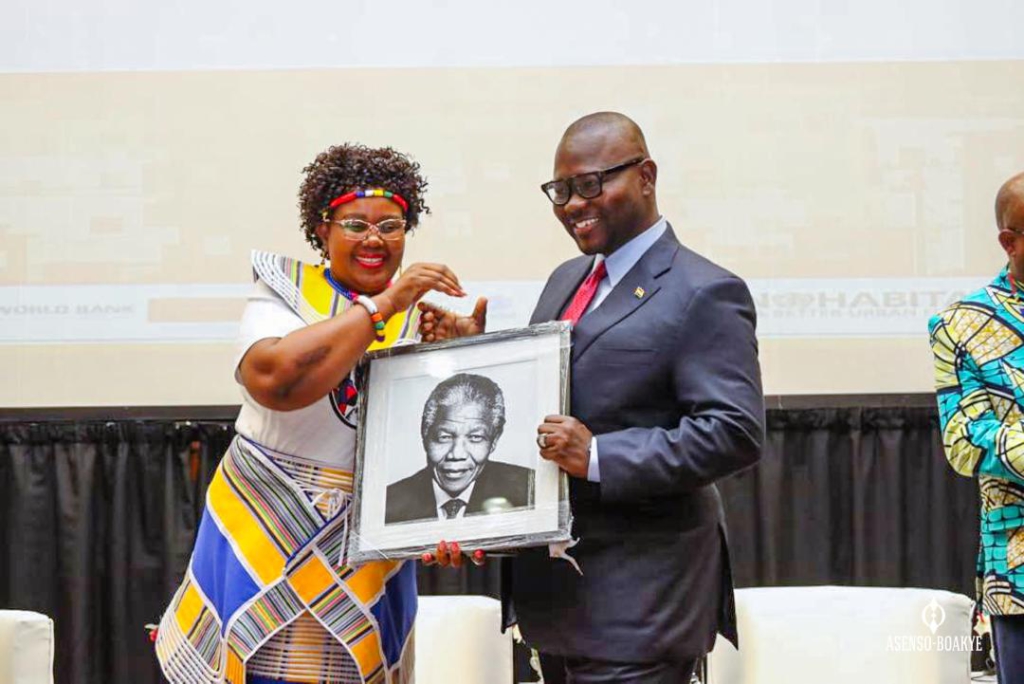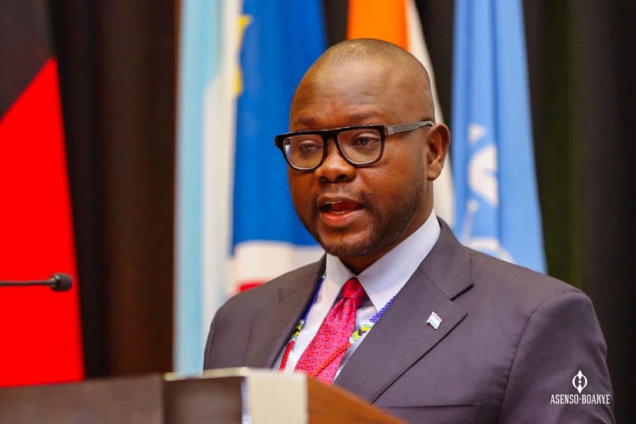The Minister for Works and Housing, Francis Asenso-Boakye has presented the final adopted communiqué at the recently concluded launch of the Global Action Plan Framework on Informal Settlements and Slums, held in Pretoria, South Africa.
The two-day high-level meeting that brought together world leaders, including Ministers and other senior government representatives sought to find lasting solutions to the global menace of informal settlements.
The Minister for Works and Housing in his presentation said that the world leaders, after the two-day high-level meeting, had endorsed the “Global Action Plan Initiative for transforming informal settlements and slums”.

He further highlighted this Action Plan as a timely and strategic multiple-partnership initiative with the leaders committing to initiating a global, regional, national, and local transformation.

“We commit to look at eight years of the Decade of Action to build the foundation for transformation in the future and introduce an initial benchmark that is catalytic to meet the needs of 1 billion slum dwellers today and 3 billion in 2050 if no action is taken”, said Minister Asenso-Boakye.
Read below excerpts of the declaration:
We are committing to the following key actions toward scaling slum transformation:
1. Multi-level participatory governance: Institutionalizing multi-level participatory governance integrated frameworks with multi-sector, horizontal, and vertical coordination among government spheres including democratic participation of all groups in planning and decision-making.
2. Data: Improve methodologies at the census level in order to reflect more accurately the reality of informal settlements and households, and disaggregated data. Collect data across all settlements, regardless of tenure status or legal regularization, through an integrated approach that goes beyond the isolated settlement level.
3. Policies: Design and review enabling legal, regulatory, planning, investments, and institutional frameworks, at local, metropolitan, and national levels. This should aim at establishing transformation targets with a long-term perspective as well as mid-term benchmarks, to create, mandate and capacitate institutions for implementation.
4. Comprehensive packages: Target incremental provision of affordable, habitable, and accessible housing with available basic services, in thriving locations. This should be characterized by availability of education and social facilities, integrated and targeted health care services, and safe and accessible public spaces of high quality, connected through inclusive mobility options and economic opportunities.
5. Finance: Establish and adequately resource flexible finance mechanisms to respond to the needs of lowest income groups. Apply integrated fiscal transfers enabling slum transformation to go to scale, leveraging multiple partnerships and investments including the private sector and communities.
6. Land: Recognizing the bridge and social function through (i) guaranteeing secure tenure and land regularization, and (ii) increasing the supply of well-located land for housing through underutilized and vacant land and buildings. Strengthen land governance systems and planning of land city-wide mainstreaming informality and housing needs, maximizing the use of public land available.
7. Community Resilience and Empowerment: Strengthen local-level governance ecosystem to ensure community participation and political empowerment. Ensure the strengthening of institutions to make community participation effective. Mainstream community participation in the formulation of transformative public policies.
8. Socioeconomic empowerment: Integrate actions by socially and financially strengthening people’s positions to contribute to development. Support innovations in identifying the potentials of the community through data generation and solution finding by collaborating with public agencies.
Support and identify champions and key stakeholders from communities and nurture them through various public institution engagements. Strengthen knowledge on climate-resilient upgrading, including tailored adaptation and mitigation measures and building climate-resilient public infrastructure.
9. Capacity Enhancement: Produce and create new knowledge based on local experiences on resilience and community behaviour. Establish knowledge platforms to enable exchange between stakeholders to enhance capacities.
10. Ensure equitable and empowered participation of the residents through direct involvement in the design of solutions, following a people-centred development approach. Public sector, private sector and civil society capacity should be as much as possible fully leveraged.
11. Implementation framework: Develop and provide operational capacity for multiple partnership frameworks and regional consultations to inform the way forward, that are supported at different levels (global, regional, national, local), expanding, and diversifying existing partnerships in consolidated and coordinated structures accelerating the implementation from the Global Action Plan.
Latest Stories
-
Bawumia joins thousands in Kumasi for burial prayers for Ashanti Regional Imam
2 hours -
Blue Gold Bogoso Prestea Limited challenges government actions in court
2 hours -
Patrick Atangana Fouda: ‘A hero of the fight against HIV leaves us’
3 hours -
Trinity Oil MD Gabriel Kumi elected Board Chairman of Chamber of Oil Marketing Companies
3 hours -
ORAL campaign key to NDC’s election victory – North America Dema Naa
4 hours -
US Supreme Court to hear TikTok challenge to potential ban
4 hours -
Amazon faces US strike threat ahead of Christmas
4 hours -
Jaguar Land Rover electric car whistleblower sacked
5 hours -
US makes third interest rate cut despite inflation risk
5 hours -
Fish processors call for intervention against illegal trawling activities
5 hours -
Ghana will take time to recover – Akorfa Edjeani
5 hours -
Boakye Agyarko urges reforms to revitalise NPP after election defeat
6 hours -
Finance Minister skips mini-budget presentation for third time
6 hours -
‘ORAL’ team to work gratis – Ablakwa
6 hours -
Affirmative Action Coalition condemns lack of gender quotas in Transition, anti-corruption teams
6 hours

